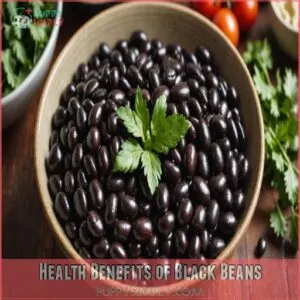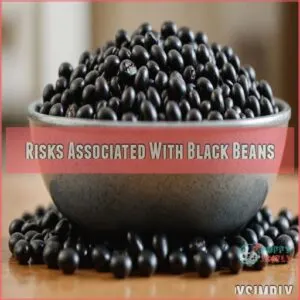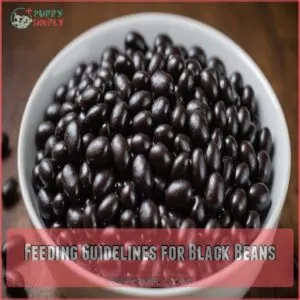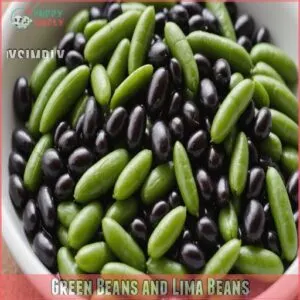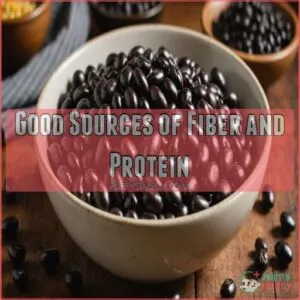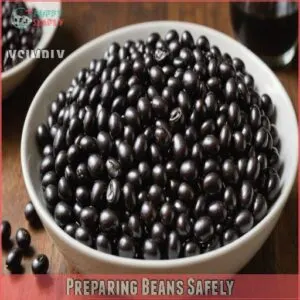This site is supported by our readers. We may earn a commission, at no cost to you, if you purchase through links.
 Absolutely, dogs can eat black beans, and they’re quite the nutritious treat when served correctly! Black beans pack a punch with protein, fiber, and essential nutrients that benefit your pup’s health.
Absolutely, dogs can eat black beans, and they’re quite the nutritious treat when served correctly! Black beans pack a punch with protein, fiber, and essential nutrients that benefit your pup’s health.
However, it’s best to cook them thoroughly and skip the salt and spices—after all, your dog isn’t auditioning for a TV cooking show!
Keep their bean intake moderate, around 10% of their daily calories, to avoid tummy troubles or weight gain.
As always, a quick chat with your vet is a smart move when introducing new foods.
Ready to discover more tail-wagging insights? There’s still plenty to explore!
Table Of Contents
- Key Takeaways
- Health Benefits of Black Beans
- Risks Associated With Black Beans
- Feeding Guidelines for Black Beans
- Safe and Unsafe Beans for Dogs
- Preparing Beans Safely
- Serving Sizes and Nutritional Balance
- Consulting Your Veterinarian
- Frequently Asked Questions (FAQs)
- Are black beans good for dogs?
- Can eating black beans cause weight gain?
- How much black beans can a dog eat?
- Can dogs eat black beans and rice?
- Can dogs eat beans?
- Can black beans cause diarrhea in dogs?
- How often can dogs eat black beans?
- Do black beans help dogs digestion?
- Can puppies eat black beans safely?
- Are there specific breeds that shouldnt eat beans?
- Do black beans affect a dogs coat health?
- Conclusion
Key Takeaways
- Black beans are a nutritious treat for dogs, providing protein, fiber, and essential vitamins, but ensure you cook them thoroughly and avoid seasonings.
- Keep black beans as a small part of your dog’s diet—only about 10% of daily calories—to prevent digestive issues and weight gain.
- Always introduce black beans gradually into your dog’s diet and watch for any allergic reactions or digestive changes.
- If your dog has a sensitive stomach, consider switching to a food with a different protein source, such as lamb or salmon, to alleviate symptoms, and consult with a veterinarian or veterinary nutritionist about the best approach, like selecting a food with a limited number of carefully chosen, premium-quality ingredients learn more about sensitive stomach dog food. Consult your vet before adding black beans to your dog’s diet to ensure they.
Health Benefits of Black Beans
So, you want to know about the good stuff in black beans for your pup?
They’re packed with protein, fiber, and essential vitamins and minerals that can boost your dog’s health, just like a superfood for humans!
Rich in Protein
If you’ve ever wondered about protein sources for dogs, black beans might be your answer.
These little legumes pack a punch, offering plant-based protein benefits.
They support muscle growth in active dogs and help maintain muscle strength in senior dogs.
It’s a safe, black beans for dogs option in moderation, adding variety to dog nutrition.
So, can dogs eat black beans? Absolutely, just keep in moderation!
Good Source of Fiber
Your furry friend’s protein-packed meal gets even better with fiber from black beans.
As a good source, they aid in dog digestion and support fiber-rich treats – think of it as a natural fiber supplement!
Balancing fiber types helps manage dog weight and minimize digestive issues.
Just keep an eye out for dog allergies, ensuring black bean benefits without the bellyache.
Essential Vitamins and Minerals
Adding black beans to your dog’s diet might feel like giving them a treasure chest of essential vitamins and minerals.
These tiny powerhouses support overall dog health and wellness, offering:
- Potassium: For muscle health.
- Magnesium: To aid enzyme function.
- Iron: To boost energy.
- Folate: For cell growth.
- B-vitamins: To balance metabolism.
With these benefits, you’re not just feeding; you’re nurturing!
Risks Associated With Black Beans
When feeding your dog black beans, be cautious as overeating can lead to digestive upset and unwanted weight gain, much like how you might feel after eating too many tacos.
Additionally, some dogs might experience allergic reactions, so keeping an eye on your pup’s response is a wise move.
Digestive Issues
Those black beans might seem like a treat for your furry friend, but they’re packed with dietary fiber, which can sometimes cause bean bloat or digestion problems.
Too much fiber-rich food may lead to black bean gas or even bean intolerance in dogs.
To keep those dog digestive issues at bay, try offering black beans in moderation as part of their balanced diet.
Allergies
Imagine this: you’re handing your pup a tasty black bean treat, but allergies might be lurking.
Keep an eye out for common dog allergies.
Here’s what to watch for:
- Bean Allergy Symptoms—itchy skin and stomach upset.
- Identifying Triggers—note any changes after meals.
- Managing Allergies—consider allergy testing for peace of mind.
Staying alert means safer, happier snacking for Fido!
Weight Gain
So, your pup’s got allergies? Let’s talk about another potential problem: weight gain. Black beans, while nutritious, are calorie-dense. Too many can pack on the pounds, leading to dog obesity. Portion control is key!
| Daily Calories | Black Bean Amount (grams) | Effect on Weight | Healthy Weight Tips |
|---|---|---|---|
| 500 | 25 | Minimal weight change | Regular exercise |
| 1000 | 50 | Potential weight gain | Balanced dog diet |
| 1500 | 75 | Significant weight gain | Treat moderation |
| 2000 | 100 | Obesity risk | Dog weight management |
Remember, a healthy weight keeps your furry friend happy and active. It’s all about balance – a little black bean goes a long way!
Feeding Guidelines for Black Beans
When feeding black beans to your dog, always cook them thoroughly without adding any salt or seasonings to avoid upsetting your pet’s delicate digestive system.
Limit their intake to about 10% of your dog’s daily calories, ensuring they get a balanced diet without risking weight gain or nutritional imbalances.
Cooking Before Serving
Before you toss black beans into your dog’s bowl, get them cooked!
Black beans need proper cooking to make sure they’re safe and digestible, preventing tummy troubles.
Here’s how you can do it:
- Boil thoroughly to soften beans.
- Cool completely before serving to avoid burns.
- Avoid raw beans, as they can be tough on digestion.
Making these adjustments brings peace of mind.
Your dog’s health is a paw-sitive priority!
Avoiding Salt and Seasonings
When you’re cooking black beans for your furry friend, skip the salt and seasonings.
Despite what your taste buds might crave, your dog doesn’t need them.
For a convenient alternative, consider purchasing dog safe beans.
Adding salt could lead to salt toxicity, and extra spices aren’t necessary for a healthy snack.
Instead, explore natural seasoning options or dog-friendly spices if
Limiting to 10% of Daily Caloric Intake
Calorie counting might sound intimidating, but it’s key for your furry friend’s health.
It’s about maintaining dog food balance and portion control while still letting them enjoy this tasty, fiber-rich food.
Make sure that black beans make up no more than 10% of your dog’s daily intake.
This treat moderation keeps their nutritional needs in check, especially when choosing legume-free dog food options like these, offering plant-based protein and healthy dog treat options.
Safe and Unsafe Beans for Dogs
Regarding feeding beans to your furry friend, knowing which types are safe can make mealtime a breeze, without any worries.
While green beans and lima beans offer a good mix of fiber and protein, it’s best to steer clear of canned, chili, and baked beans due to their unhealthy additives.
Green Beans and Lima Beans
Think of green beans and lima beans as the trusty sidekicks of dog-safe snacks.
They make great dog food alternatives because they’re nutritious, straightforward, and loved by many pups.
For you and your furry friend:
- Green beans add crunch without extra calories.
- Lima beans boost flavor with fiber-rich goodness.
- Preparation tip: Serve them plain and unseasoned for a happy, healthy pooch!
Good Sources of Fiber and Protein
So, you’ve learned about green beans and lima beans. Now, let’s talk protein and fiber! These nutrients are super important for your pup’s health. Here’s a handy guide:
| Bean Type | Protein Source? | Fiber Rich? |
|---|---|---|
| Green Beans | Yes | Yes |
| Lima Beans | Yes | Yes |
| Lentils | Yes | Yes |
Remember, moderation is key! To minimize digestive issues, consult a veterinarian before introducing beans like Cooked Red Beans Safety into your dog’s diet. Always cook beans thoroughly before serving them as healthy dog treats.
Looking for more fiber-rich foods? Check out some fiber-rich vegetables!
Bad Beans – Canned, Chili, and Baked Beans
You’ve probably nailed the benefits of green and lima beans, but keep clear of canned, chili, and baked black beans dogs’ products on Baked Black Beans Dogs.
These contain preservatives and high sodium levels that can mess with your dog’s health.
Chili beans pack a spicy punch that’s risky for their digestion, while baked beans often swim in a
Preparing Beans Safely
To prepare black beans for your furry friend, start by cooking them thoroughly to eliminate any harmful substances.
Remember to serve them plain and gradually introduce small amounts to make sure your dog’s tummy stays happy!
Cooking Thoroughly
If you’re wondering how to safely prepare black beans for your dog, cooking thoroughly is key, similar to how peeling and properly preparing jicama for dogs is crucial to avoid toxic reactions.
Uncooked beans have lectins, which can upset your pup’s stomach.
Aim for a soft bean texture by cooking at a safe temperature and time.
This method helps in preventing spoilage.
Properly cooked beans can be a delightful and healthy addition to your furry friend’s diet.
Avoiding Harmful Additives
After you’ve cooked the beans thoroughly, keep an eye on those sneaky additives.
You’re avoiding preservatives or flavorings that might upset your pup’s tummy.
Natural ingredients are key, such as fiber-rich black beans for dogs.
Think of it like reading food labels at the store—you’re on the hunt for healthy alternatives to make sure your furry friend’s meal is both safe and delicious.
Serving Plain
Once you’ve skipped adding salt or spicy extras, serve plain beans to your furry friend.
Simple and straightforward, plain beans guarantee dog safety, letting you explore bean variety while keeping dietary needs in check.
Black beans are a nutrient-rich, fiber-rich food option similar to cooked pumpkin that aids digestion. They’re a healthy dog snack, a real treat.
Just like kids and candy, moderation is key – too many beans might lead to tummy troubles.
Starting With Small Amounts
When you’re just getting your dog started on black beans, think of it as a mini taste test.
Begin with small amounts to monitor their reaction.
Here’s a quick guide:
- Start with a tiny portion – think pea-sized.
- Watch closely for any changes in digestion or behavior.
- Consider your dog’s size when adjusting portions.
- Vary the bean type to keep things interesting and nutritious.
Serving Sizes and Nutritional Balance
Getting the right amount of black beans is key for your pup’s health!
Remember, moderation is best – think of it like a delicious, healthy snack, not a main course, to keep things balanced and avoid any tummy troubles.
Recommended Daily Intake
You’ve got black beans ready—now let’s talk serving sizes.
Carefully measure to avoid overloading your pup.
Aim to keep bean intake around 10% of their daily calories.
You can also explore black bean dog treat options for a convenient and healthy snack.
| Black Bean Treats | Daily Caloric Limit |
|---|---|
| Small Dogs | 1-2 tablespoons |
| Medium Dogs | 2-3 tablespoons |
| Large Dogs | 3-4 tablespoons |
Avoid black bean allergies by observing your pet’s reaction closely.
Balancing With Other Foods
Balancing beans for dogs ain’t rocket science.
Mix them with other fiber-rich foods to create a healthy dog food buffet. For portion control and meeting nutritional needs, think of beans like a side dish to your main meal.
To avoid digestive issues, remember that beans should be given in moderation.
Consider these tips:
- Pair beans with dog food to boost plant-based protein.
Avoiding Overfeeding
Watch those bean portions to keep your dog’s weight in check!
Overfeeding black beans could lead to digestive issues and tip the scales of canine health.
Stick to treating with moderation—think of it like a special occasion dessert, not the main meal.
This approach helps maintain a healthy dog food balance.
Always monitor your pup’s treat frequency to make sure their pet nutrition is on point.
Consulting Your Veterinarian
When you’re considering giving your dog black beans, it’s always a smart move to chat with your vet first.
They can help you navigate any health concerns and keep an eye out for potential reactions, so Fido stays happy and healthy.
Introducing New Foods
When introducing new foods like black beans into your dog’s diet, it’s always wise to consult your vet first.
Veterinarian approval makes sure the food aligns with your pet’s nutrition needs and avoids potential food allergies.
Considering your dog’s life stage, such as puppy food formulas, can also help you make informed decisions about their diet.
Gradual introduction is key, allowing you to see how your
Monitoring for Adverse Reactions
Keeping an eye on your pooch’s responses to black beans is key to understanding that common culprits like beef and dairy proteins can also cause scratching, tummy troubles, ear infections, skin rashes, and excessive paw-licking, and to avoiding dog food allergies and bean intolerance.
Gastrointestinal upset, vomiting, and diarrhea can signal trouble.
If your dog shows any of these signs, a chat with your vet might be needed.
Remember:
- Monitor eating habits
- Check for unusual behavior
- Look for oral health signs
- Track digestive changes
- Keep open communication with your vet
Addressing Health Concerns
So, you’ve noticed any tummy troubles, skin rashes, or changes in your pup’s weight? Don’t panic! These are all reasons to chat with your vet. They can help you figure out if black beans are the culprit or if something else is going on.
Your vet’s expertise helps guarantee your dog’s nutritional balance and overall canine health. They’re the best resource for dog nutrition advice, especially regarding potential allergies or digestive upset.
Plus, they can offer tips for weight control and even address any dental issues – maintaining good dog oral health is key! Regular veterinary care is a great way to keep your furry friend happy and healthy.
Frequently Asked Questions (FAQs)
Are black beans good for dogs?
It’s funny how something as simple as a bean can boost your dog’s health.
Black beans offer protein and fiber, but feed them sparingly.
Always cook them without seasoning, keeping 10% of daily calories as the limit.
Can eating black beans cause weight gain?
Feeding too many black beans to your dog can indeed lead to weight gain.
Since they’re calorie-dense, always stick to moderation, ensuring black beans make up only 10% of your dog’s daily caloric intake.
How much black beans can a dog eat?
Ever wondered how many black beans your pup can munch on?
Stick to about 10% of their daily caloric intake.
Remember, slowly introduce beans into their diet, and watch for any digestive issues.
Safety first!
Can dogs eat black beans and rice?
Yes, but only cooked black beans and plain rice in small amounts.
Too much can upset their tummies!
Always check with your vet first, just to be safe.
A little goes a long way!
Can dogs eat beans?
In terms of beans for dogs, not all are created equal.
Black, green, and lima beans can be healthy treats, but avoid canned or spicy beans.
Always cook them to prevent digestive issues.
Keep it moderate!
Can black beans cause diarrhea in dogs?
Feeding black beans to dogs can lead to diarrhea if they’re introduced too quickly or in excess.
Stick to small amounts and cook them first to keep your pup’s tummy happy.
Always watch for any digestive changes.
How often can dogs eat black beans?
Picture your pup’s tail wagging—that’s how often they can enjoy black beans, but only occasionally as a treat.
Stick to a few times a week, ensuring beans make up no more than 10% of their caloric intake.
Do black beans help dogs digestion?
Black beans can be a dog’s digestive ally, thanks to their fiber content.
Just like us, moderation is key.
Overfeeding might upset their tummy, though.
So, start slow, keep an eye on reactions, and consult your vet.
Can puppies eat black beans safely?
Think of black beans as a side dish for puppies.
They can nibble on cooked beans occasionally, but start slow and watch for any tummy troubles.
Avoid adding spices or salt, and always check with your vet first.
Are there specific breeds that shouldnt eat beans?
No specific dog breeds are strictly prohibited from eating beans, but some might develop digestive issues or allergies.
It’s wise to introduce beans gradually and consult your vet, especially for breeds with sensitive stomachs or special dietary needs.
Do black beans affect a dogs coat health?
Moderation’s key! Small amounts of cooked black beans won’t hurt your pup’s coat, but too many might cause tummy troubles. Always check with your vet before adding new foods.
Conclusion
Think of black beans as little black pearls of nutrition for your dog’s diet.
They offer a boost in protein, fiber, and essential nutrients, but remember to keep it simple—cook them well and steer clear of seasonings.
Let them make up only 10% of your dog’s daily calories to avoid any tummy troubles.
So, can dogs eat black beans? Absolutely! Just start small and always consult your vet for personalized advice. Sharing new foods can be rewarding and healthy!

